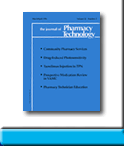 |
 |
THE ROLE OF TECHNICIANS IN MANAGING COMPUTERIZED DRUG–DRUG INTERACTION ALERTS IN COMMUNITY PHARMACIES AND THE RELATIONSHIP TO PHARMACIST MANAGERS' ATTITUDES
John E Murphy, Daniel C Malone, Grant H Skrepnek,
Edward P Armstrong, Jacob Abarca, Amy J Grizzle,
Rick A Rehfeld, and Raymond L Woosley
To request full article click here.
BACKGROUND: Community pharmacies are where identification and prevention of drug–drug interactions (DDIs) typically occur. Technicians have been shown to play some role in the initial screening of DDIs in community pharmacies.
OBJECTIVES: To examine the role of technicians in the management of DDI alerts in community pharmacies and the possible relationship to the attitudes of pharmacy managers toward DDI alerts.
METHODS: A national survey of pharmacist managers in 3,000 community pharmacies was conducted. Data collected included demographics, workload issues, handling of DDIs, and pharmacists’ attitudes toward computerized DDI alerts.
RESULTS: Of questionnaires returned, 736 could be used. Technicians were more often allowed or sometimes allowed to override lower level DDI alerts without prior review by a pharmacist. However, some pharmacies (2.1%) allowed or sometimes allowed technicians to override interactions with the highest potential clinical significance. Stores with the highest use of technology were less likely to allow technicians to override insignificant interactions. Stores that allow technicians to override clinically significant interactions were less confident in their program’s ability to provide meaningful alerts and more likely to agree that alerts are a waste of time and that the volume of alerts makes differentiating important from unimportant DDIs more difficult.
CONCLUSIONS: Pharmacy technicians play a limited role in the management of DDI alerts, but could be used to help ensure that a patient’s profile of medications is up-to-date and determine whether the patient had already been receiving the combination without notable problem.
J Pharm Technol 2005;22:155-60.
To request full article click here.
|
|
|
||
|

